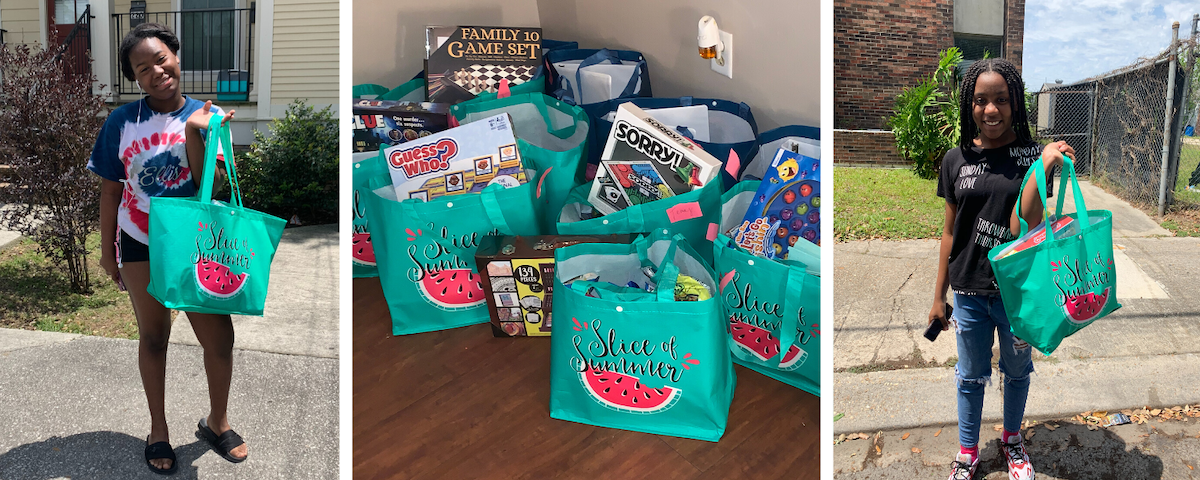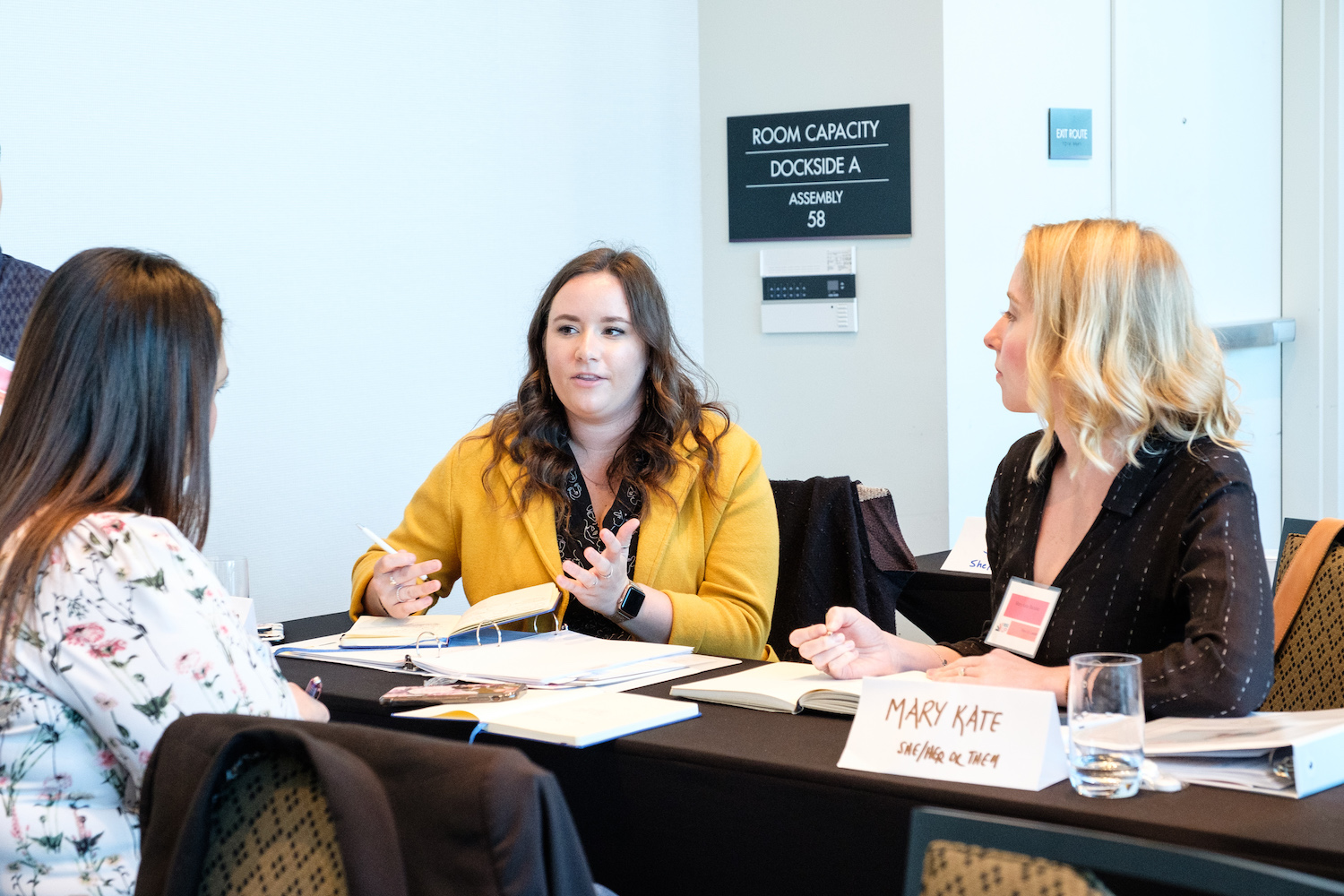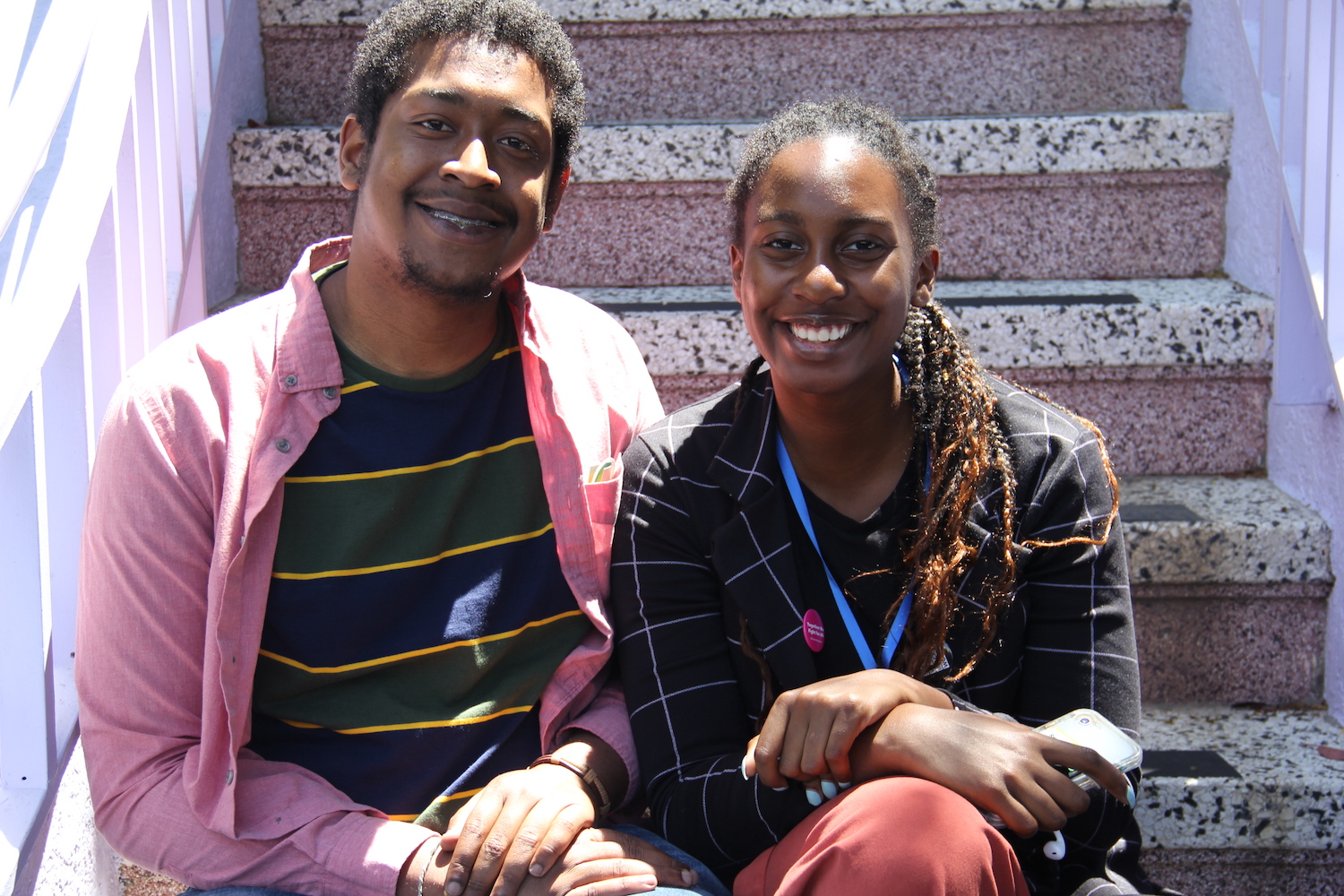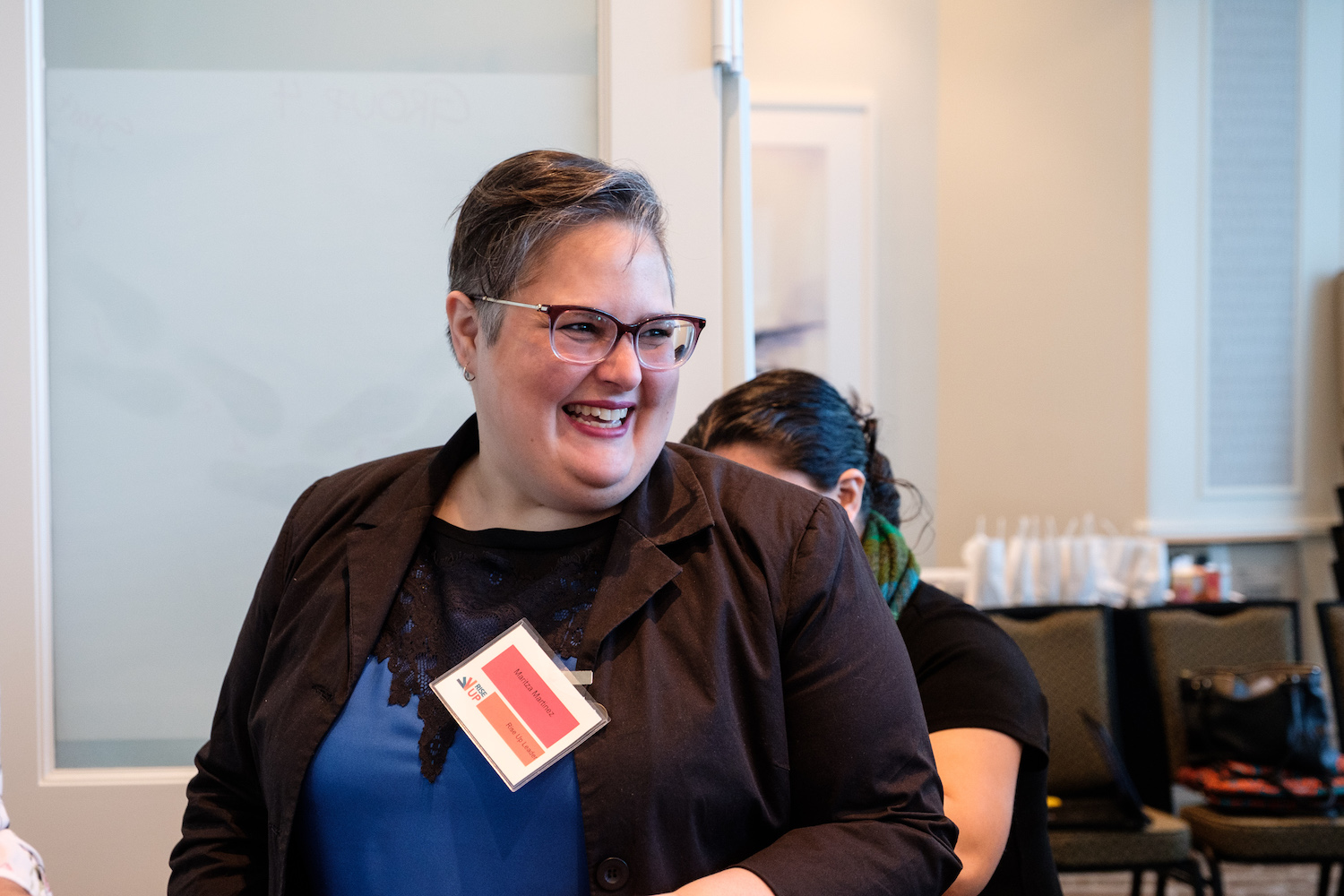As part of our ongoing series sharing COVID-19 response updates from Rise Up Leaders around the globe, Rise Up Leaders in the United States discuss the effects of the pandemic on their communities and their work to advance gender equity.
By Chantal Hildrebrand, Rise Up Program Manager
As nations across the globe grapple with how best to respond to the growing COVID-19 pandemic, we are coming face to face with the deeply devastating disparities and inequities that plague our world. In the United States, problems we often associate with countries in the “developing” world — such as poverty, lack of access to quality and affordable healthcare, a high prevalence of gender-based violence, and high rates of unemployment — are happening in our own backyard, making them hard for anyone to ignore.
As the COVID-19 pandemic highlights these deep inequities in the U.S., the continual fear and violence inflicted by police against Black people, and non-Black people of color, has spurred thousands of Americans to call for justice. This call for change has fueled extensive advocacy pushing for racial equity and increased funding to create healthier communities.
Across the U.S. girls, women, and youth are significantly impacted by but often left out of decisions about our response to crises like COVID-19 and solutions for community safety. In California, Mississippi, and Louisiana, Rise Up Leaders are taking a stand and fighting for the rights and wellbeing of women, girls, and youth.
Leader responses have been edited for length and clarity.
Nakita Angelle Shavers | Louisiana
Founder and Executive Director, GIRLS NOLA and the Dinerral Shavers Educational Fund
Rise Up Leader since 2014 (YCI)
“COVID-19 is disproportionately affecting the lives of African Americans in my community, and this global pandemic has drastically impacted the young women of GIRLS NOLA. Many of the girls we work with are experiencing a sudden loss of or decrease in resources. Therefore, it is incumbent upon our organization to step in and offer whatever services we can to uplift, educate, and provide for the young women and families whom we serve.
GIRLS NOLA was scheduled to begin our first cohort of 2020 on March 14. Unfortunately, that was also the weekend that our city and state implemented a mandatory stay-at-home order. This totally crushed our girls and our instructors. I was receiving calls and sad messages from girls and parents every day. We had been patiently counting down the days to the start of our program. The initial feelings I had were of defeat and failure, but then a creative spirit came over me. I began to assess the resources available to me. The most obvious resource was Zoom. Then I got the idea to create a virtual program for the girls.

Care packages that Nakita created and delivered to GIRLS NOLA participants at their homes during the pandemic
After talking with many of the girls and parents, and even taking into consideration my own mental health at the time, I decided to revise the GIRLS NOLA Curriculum. I realized that, although the girls needed sex education, we all needed mental health support as well. I researched and created several modules on stress, coping skills, self-care, self-esteem, building a support system, and more. I created care packages for each girl, which included their GIRLS NOLA binder, notebook, and workbooks that included all of their assignments. Then I hand-delivered these care packages to each of the girl’s front porch (practicing social distancing of course).
This global pandemic has taught me many lessons. Chief amongst them is to protect my mental health. I am a mentor, I am a nurturer, I am a role model, I am a teacher, I am a provider, and to many I am considered a second mom. When COVID-19 first hit my community, the kids I work with were reaching out to me constantly. They needed answers, they needed reassurance, they needed comfort, they needed support. Unfortunately, I could not offer them that at the time because my life was falling apart. I, too, was stressed about the future of our society, my health, my family’s health, and my finances. It wasn’t until I took the time to practice self-care, and take care of my needs mentally, that I was able to show up and be present for my kids. Also, once I took care of my mental health, my creativity began to flow. And our virtual GIRLS NOLA initiative was formed.
The impact of COVID-19 is a hard pill to swallow, but we will get through it by supporting one another.
Sarah Johnston | California
Program Manager, Central Valley Against Human Trafficking, Fresno Economic Opportunity Commission
Rise Up Leader since 2019
“When COVID-19 stopped the world in its tracks this spring, it became clear to us in the Central Valley of California that change was necessary to prioritize the safety and health of our staff, partners, and clients. Staff went to work remotely from home, and conferences, trainings, and trips were canceled. Yet, for our clients who are victims of human trafficking, their circumstances changed little and their needs did not stop.

Sarah Johnston (center) during Rise Up’s California Advocacy and Leadership Accelerator in 2019
In the beginning of the pandemic, there was much discussion in the social services field surrounding safe housing and concern for domestic violence and child abuse victims, as they were now spending an extended amount of time at home with their abusers. There was little talk about human trafficking victims and their increased vulnerability in this global pandemic. Victims of human trafficking fall into two categories of exploitation, labor, or commercial sex work. Both categories are driven by the mentality of need and vulnerability. Many victims fall into exploitative environments due to poverty, lack of support, and prior or current violent or abusive home situations. Many of these elements of vulnerability are heightened during the COVID-19 pandemic, increasing the risk of further exploitation.
Additionally, the kinds of precautions taken by agencies, stores, and businesses are not of great concern in exploitive labor or commercial sex situations. Buyers of sex may not take health precautions of wearing masks and washing hands during commercial exchanges. Employers who exploit their workers’ labor are often under the radar and not regulated and put their workers in harm’s way, often ignoring the government advisories and regulations intended to keep workers safe. This lack of precaution means that victims and survivors of human trafficking face increased risk of exposure to COVID-19, in addition to the exploitation they experience at the hands of their traffickers.
At Fresno EOC Central Valley Against Human Trafficking, our efforts to address trafficking during the COVID-19 pandemic have increased creativity in our work, including the development of virtual resources such as trainings, support groups, and case management. We have also changed tactics regarding safety planning and case planning with clients to encompass the risks of COVID-19. There is no silver lining in this pandemic. COVID-19 has created a trying environment full of fear, complications, and anxiety. Yet, the understanding of true community and creative service have thrived under the current conditions and the human spirit has endured. We see this in the anti-trafficking movement in the Central Valley as well as across the globe. Here in the Valley we continue to serve survivors and will endure.”
Antwan Matthews | California
Community Leader and Health Advocate
Rise Up Leader since 2019 (YCI)
“The Bay Area was one of the first United States metropolitan areas to promote the shelter-in-place order and really set a standard for the rest of the U.S. to follow. However, the Bay Area still struggles with addressing homelessness. For example, when the lockdown first started, mayors of Bay Area communities were saying, “The most important thing you can do is stay at home!” – completely disregarding how many people in the Bay Area are homeless and are staying on the streets or in their cars. Using language saying “the most important thing you can do is stay at home” is a total slap in the face for people who are experiencing homelessness. Encampments can have as many as 30-40 people who stay in close proximity to each other, which means if one person gets COVID-19 that whole encampment is at risk.
When shelter-in-place started, I leapt into action to remind our society to not forget about the homeless. I went to grocery stores and gathered lunch material to prepare bag lunches for people experiencing homelessness in Berkeley. I then started to reach out to colleagues who stay in Berkeley to see who can help volunteer to prepare the lunches and pass them out to local encampments. We prepared the meals and took them out to different locations.”

Antwan (left) during Rise Up’s Youth Champions Initiative Incubator in 2019
“Racism and prejudiced beliefs against Black and Brown people are a vital concern during this pandemic. We are not safe even when our lives depend on it and [even during the pandemic] we still have to worry about the hardships of trying to live each and every day. Now we must figure out how to deal with racism and racial profiling during a time period unlike anything our generation has ever seen before.
COVID-19 has caused me to mobilize with colleagues to create innovative solutions to help alleviate social determinants of health in communities of color. We are in development to start a nonprofit in Berkeley to help redefine the philosophy of health in communities of color, since we are the ones most affected by an array of social determinants and by the lack of healthcare accessibility. The core values of a nonprofit that aims to help people should be focused on building trust with community members, vulnerable populations, and people with lived experience through community-based participatory research, which can help provide appropriate solutions for populations we will serve.
As a nation, we should collectively work on our implicit and explicit biases. Being racist will not decrease the spread of COVID-19, it will just make matters worse. This is time for us to learn and mobilize and work for a great cause. People are dying because of poor leadership and the lack of understanding of how serious COVID-19 is! This is not a time to further division but to promote inclusion and prosperity amongst humanity.”
Maritza Martinez | California
Executive Director, Somos Familia
Rise Up Leader since 2019
“This pandemic has only highlighted the disenfranchisement and marginalization that LGBTQI+ people of color and their families face daily. Many people have faced a dramatic increase in fear, food insecurity, and housing instability, and are having difficulty meeting other basic needs. For those in our community who are immunocompromised, the long periods of isolation and fear of infection have been difficult. Many in our community who work in the service industry have gone months without a paycheck and, as a result, have anxiety about how to pay all the back rent their landlords will expect at the end of shelter-in-place. Many youth whose families do not accept their LGBTQI+ identities are sheltering in place at home without being able to be their true selves and enduring negative comments daily.
As an organization that does much of our work in-person, Somos Familia has had to shift to virtual platforms and support our community in accessing our groups and services in new ways. We host monthly groups in Spanish, one for families with LGBTQ family members and another for trans men. We have been using Facebook Live almost weekly to keep our community connected to our work. Additionally, we worked to fill the gap in information about COVID-19 and all the ever-changing policies being issued by the state and local governments by creating an FAQ with information needed to stay safe and healthy. Lastly, we responded to community needs for financial support by creating a fund that prioritizes LGBTQI+ undocumented folks and families that support them.
When we opened our COVID-19 relief fund we had no idea that we would be flooded by requests for support in the two weeks that it was open. We received over 1,400 requests for financial support. We are still working to raise funds to support our community’s basic needs, like housing, groceries, diapers, medications, and other necessities.
Our peer support networks make a huge difference in times of isolation. We have seen an increase in participation in our support groups, which are now virtual, as well as in interaction with the organization on social media. Our people are resilient and have survived many difficult experiences to get here. Many in our community have crossed multiple borders for a chance at a life where they can be their authentic selves without fear or violence.

Maritza during a team building activity in the California Advocacy and Leadership Accelerator
As Pride Month comes to an end, we celebrate the rights we have gained over the last 50 years but we also remember that Pride began as a protest, and the fight is not over. As Marsha P. Johnson, pioneer of the LGBTQ+ movement, said: ‘There is no Pride for some of us, without liberation for all of us.’ This continues to be a call to action that we must continue to fight for Black lives and Black trans lives at the forefront of our work for change.”
For more information about Rise Up Leaders’ work please look out for the next blog on the Rise Up Leaders at the Frontlines series.


